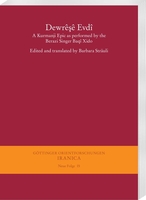|
|
more titles of the subject:
Download:
Please note: With adding digital Products to your cart
the payment will be handled via PayPal. The download will be provided after the payment is confirmed. The 200-year-old war epic Dewrêşê Evdî (Dewresh, son of Evdi) is a highlight of the singing tradition of the Berazi Kurds, a tale of intertribal conflict and tragic love.
In 1987 the Kurdish intellectual and author Shahin Bekir Sorekli asked the famous singer Baqi Xido for tapes of the epic and produced a meticulous transliteration, the base to this edition. Its introduction, glossary and notes reflect numerous interviews with older Berazi Kurds with a nomadic past, which made a close semantic reading of the text possible. They also furnished background information on migrating habits, place names, clothing and Bedouin custom law as well as memories of Berazi singers and their performances. These interviews were checked against travelers’ accounts, scholarly research and photographs from the Western Jazira. Inquiries were also made into singers’ tools of oral-formulaic composition and the oral genres of the region. As opposed to many Yezidi variants, the story of the Yezidi hero Dewrêş is here sung by a Muslim singer. Besides, Baqî Xido’s narrative mirrors factual relations among Kurds and Arabs up to World War II. As a result, there emerges the picture of a strong Kurmanji oral tradition in an ethnically mixed border region and shaped by the nomadic habits of the steppe. |
|||||||||||||||||||||||||||||||||||||||||






